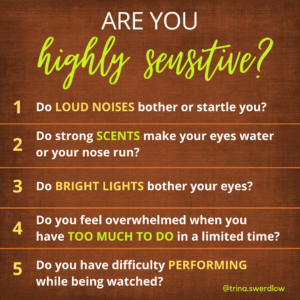When it comes to being in an environment you experience as intense, are you sensitive? Do you relate to any of these challenges?

If so, then you may benefit from learning more about the traits of a “highly sensitive person” (HSP). In 1996, psychologist Dr. Elaine N. Aron coined the term “highly sensitive person” to indicate a person who processes “sensory data”—sounds, sights, smells, and physical sensations—deeply and thoroughly. Since then, she has written numerous books on this fascinating topic (she’s a “highly sensitive person” herself).
According to Dr. Aron, and other clinical researchers, about a fifth of the population are highly sensitive people. As a result, the thorough sensory data processing style of HSPs may trigger over-stimulation of the nervous system that can lead to stressful feelings of overwhelm.
Now, there are plenty of POSITIVE TRAITS that result from being an HSP. For example, “highly sensitive people” are often:
- Creative
- Intelligent
- Intuitive & empathic
- Deep “thinkers” & “feelers”
Okay, now that I’ve accentuated numerous positive traits of HSPs, I’ll admit that I am a “highly sensitive person.” Yep, I found out that I shared many of the associated traits when I attended one of Dr. Aron’s lectures many years ago.
Meanwhile, in a world that appears to thrive more and more on intensity—it’s important to maintain balance. It’s vital that HSPs have access to self-care tools. For example, by planning ahead an HSP can prepare and prevent feeling over-stimulated when entering sensory-intense situations.
~ 3 TIPS for “Highly Sensitive People” ~
When in Large Groups—Take Frequent Breaks
Because HSP nervous systems are prone to hyper-arousal in groups—due to high levels of sensory stimulation—a short break can be a good self-care strategy. For instance, a “bathroom break” is an opportunity for HSPs to not only use the facilities, but also to splash cool water on their faces, and relax by taking slow, deep breaths. Bringing their focus back to themselves (and the present moment) in a less-stimulating environment is one great way to momentarily retreat and recharge!
Divide Large Tasks into Small Steps
When your To-Do list has some big projects on it, try making a separate list for each project that breaks down the tasks into manageable steps. That way, you can focus on one list, and cross off each step—celebrating your productivity. Whittling down one manageable To-Do list at a time can help prevent a stress-induced “freeze response” (aka: “analysis paralysis”) and allow productivity and personal satisfaction to keep flowing.
Carry a Pair of Earplugs
 HSPs often feel stress-levels rise when they are in noisy environments. So, carrying a pair of earplugs is another great “self-care” strategy. For example, at movie theatres or live concerts, the high-tech sound systems can be “a bit too much” for an HSP’s ears.
HSPs often feel stress-levels rise when they are in noisy environments. So, carrying a pair of earplugs is another great “self-care” strategy. For example, at movie theatres or live concerts, the high-tech sound systems can be “a bit too much” for an HSP’s ears.
That’s when reaching for a pair of foam earplugs can be a blessing. Adjusting the foam inside the ears can “dial down” auditory intensity and “dial up” enjoyment!
~ Take Care of Yourself ~
Highly sensitive person or not, I suggest protecting yourself from stressful feelings of overwhelm by practicing good self-care. Then, let your creativity, intuitive gifts, and talents flow smoothly.


